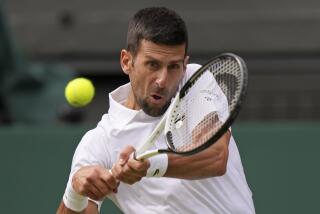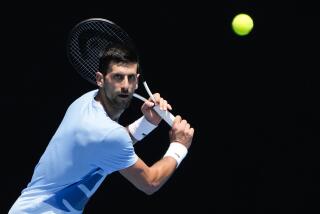Kuerten Must Do More Than Scratch the Surface
Gustavo Kuerten could be the superstar tennis needs, if only he would try.
Kuerten has a mop of floppy curls and the sad eyes and sweet smile of a lonely poet. He has a nickname, Guga.
The girls love Guga, the teenage ones who swoon when he walks by, who crowd the practice court at UCLA when Kuerten comes to practice the day before his first match at the Mercedes-Benz Cup. There is always a samba being played in the stands when Brazil’s best tennis player is on the court. In Stuttgart or Paris, in Miami or Monte Carlo, wherever Guga plays, the stands are filled with men and women, boys and girls, wearing the colors of Brazil--blue, green and gold--and pounding drums and shouting “Guga.”
Kuerten is the one foreign-born tennis player Americans would love, really love, if only he would let them.
But the flaw of Kuerten, the No. 1-ranked player in the world, is that he is stuck in a rut. A red clay rut. So far this year, Kuerten has a 36-3 record on clay; a 6-3 record on hard courts; a 0-0 record on grass.
According to the latest edition of International Tennis Weekly, Kuerten is “Still King of Clay.” Kuerten, 24, has won three French Open titles and had not a whiff of winning any other Grand Slam event. Guga has been a quarterfinalist once each at the U.S. Open and Wimbledon. Not good enough.
Kuerten skipped Wimbledon this year, claiming a bum leg, a suspicious injury that seemed to arise when he and some of his other clay-court aficionados threatened a boycott over a seeding dispute.
So Kuerten hadn’t played tennis since he won the French Open in May until last week when Kuerten made one last grab for ranking points by winning one last clay-court event in Stuttgart.
Kuerten advanced to the quarterfinals of the Mercedes-Benz Cup by defeating American Robbie Ginepri, 7-6 (4), 6-2, Thursday. Kuerten slogged through the first set as if he were caught in a mosquito net, fighting through the haze of jet lag, but found his legs and his verve in the second set.
Becoming the best player in the world was never something he considered possible, Kuerten said afterward. He had a lower-middle-class upbringing in a seaside town. His father died before Kuerten became a teenager and he was not in an environment where being cutthroat and competitive was ingrained as part of his daily tennis drills.
So Kuerten floats around the world, winning in places such as Acapulco, Buenos Aires and Stuttgart, but not in Melbourne or New York or London, not even in Indian Wells or Miami. Kuerten is ephemeral, a wisp of a man, thin and gangly. He moves lightly across the court, barely leaving a scuff mark, but he is also not leaving his mark on the game. The world’s No. 1 needs more fire.
Half a world away, in Kitzbuehl, Austria, Yevgeny Kafelnikov, once a lightweight No. 1 himself, grumbled Thursday that tennis is “destined for oblivion,” because the upcoming players aren’t handling the demands of being stars.
This is the ultimate pot-kettle-black situation, but Kafelnikov had a point. “We used to have [Boris] Becker, [Stefan] Edberg. Now we just don’t have the big, intelligent players any more. It is no surprise that this sport is losing fans,” Kafelnikov said.
Something needs to be done, soon, Kafelnikov complained, now that Andre Agassi and Pete Sampras are near retirement, “to win back the fans and get this sport out of this low.”
Kuerten is 6 feet 3 and he isn’t unintelligent. He just doesn’t seem to want to win more than he wants anything in the world.
His next goal, he says, is to win more French Opens.
No, Guga, wrong answer.
As the world’s No. 1 player, Kuerten needed to say he wants to win Wimbledon, to win the U.S. Open. The four Grand Slams were not created equal and when Kuerten said that besides winning more French Opens, his next choice would be to win the Australian Open, it was the wrong answer again.
The biggest stage for tennis is first at Wimbledon and second at the U.S. Open. Last year Kuerten won as many matches on hard courts (28) as he did on clay. He won a hard-court tournament in Indianapolis last summer and also at the season-ending Tennis Masters Cup in Lisbon. Guga has the game to win somewhere besides Roland Garros. But he needs the will and he needs the practice.
After playing only two matches on hard courts here, Kuerten was peeling the skin off his foot Thursday. His toe hurt. Kuerten said he used the wrong kind of tape.
Kuerten also said he was happy to have missed Wimbledon, that he needed the rest, that “I could only have played if I had a third leg.” It was more important, he said, to relax and rejuvenate himself for the summer season.
But in what other sport do athletes skip the most prestigious event to rest up? In what other sport can an athlete be ranked as the sport’s best when he can dismiss its most famous, most historic two weeks as a good time for some R&R;? It’s as if Shaq decided to miss the NBA Finals so he could be totally frisky for training camp.
Sampras, who spent six years as the top-ranked player, may never have won the French Open but at least he played it. Ivan Lendl made a big point of skipping Wimbledon. “Grass allergies,” Lendl would sneer while he played golf during his vacation. But then Lendl won all the other Slams and became desperate to win Wimbledon at the end of his career.
Some day, Sampras said, Kuerten might regret his nonchalant dismissal of Wimbledon. And maybe he will. But first Kuerten is going to have to want something enough to fight for it.
Problem is, his sport needs Kuerten to win more than Kuerten needs to win. Tennis needs an international star more than Kuerten needs to be one. So Kuerten gets to be No. 1. And the sport will suffer.
*
Diane Pucin can be reached at [email protected].
More to Read
Go beyond the scoreboard
Get the latest on L.A.'s teams in the daily Sports Report newsletter.
You may occasionally receive promotional content from the Los Angeles Times.










